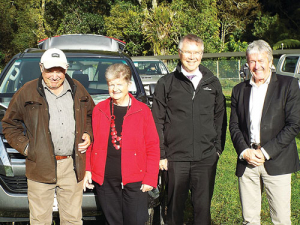Damien O’Connor: NZ united on global trade
When it comes to international trade, politicians from all sides of the aisle are united, says Labour's trade spokesman Damien O'Connor.
 Environment Minister David Parker and Agriculture Minister Damien O’Connor with Cambridge farmers Bill and Sue Garland.
Environment Minister David Parker and Agriculture Minister Damien O’Connor with Cambridge farmers Bill and Sue Garland.
The double-D’S were front and centre at Karapiro, Waikato, recently to promote a voluntary water quality initiative.
David Parker and Damien O’Connor, ministers for the environment and agriculture, respectively, joined industry leaders to endorse the Good Farming Practice-Action Plan for Water Quality 2018.
The plan was developed largely from principles set out in the 2015 Industry-Agreed Management Practices first applied by Environment Canterbury.
The voluntary initiative is led by Federated Farmers, Beef + Lamb NZ, Dairy NZ, Horticulture NZ, Irrigation NZ and people from regional councils and regulatory authorities.
The chief aim is to help make rivers swimmable and to improve the ecology of waterways, so the plan advocates good farming practices -- assessing individual and regional catchments, measuring and showing improvements and telling the public about progress.
At grassroots level this will see workable plans being drawn up to identify physical and topographical constraints, and identify land where cropping should cease because of erosion risks. The plan includes keeping accurate records of inputs and outputs, and managing run-off, sediments and nutrients entering waterways.
Environment Minister David Parker applauded the voluntary nature of the plan and conceded that regulation “might not be the b-all and end-all”. But he said rules and regulations would be part of the solution, as would better education and perhaps “pricing” to influence behaviour.
Parker’s former flatmate Minister Damien O’Connor noted “the need for guidelines in tune with the environment, and for a part of the social licence that allows landowners to operate”.
NZ agriculture and horticulture needs to be the best producer in the world, he said, with their output “food for people who care, produced by farmers and growers who care”.
The plan now is to spend the next two years enlisting farms and local and regional authorities in a campaign going through to 2030.
Mating wrapped up last month at the across-breed Beef Progeny Test on Pāmu’s Kepler Farm in Manapouri.
Libby Judson is a keeper of memories from an age gone by. Tim Fulton tells her story.
A New Zealand-first native tree study has highlighted the Bioeconomy Science Institute's position as a forestry research leader.
Hemp fibre processor Rubisco is relocating its core processing facility to Ashburton as part of a $20-$30 million expansion to leverage what it says is an accelerating global demand for sustainable and renewable fibres.
Tradition meets some of the latest in technology at the 2026 East Coast Farming Expo.
OPINION: Trade Minister Todd McClay and the trade negotiator in government have presented Kiwis with an amazing gift for 2026 - a long awaited and critical free trade deal with India.